Okezue Bell is the 16-year-old founder and director of Fidutam, a project working to develop a decentralized banking infrastructure created specifically for low-income, underbanked, and unbanked individuals across the United States and globally. The company has won over $50,000 in awards and won 1st place at the International Career Development Conference (ICDC). Outside of directing Fidutam, Okezue conducts neuroscience research at Harvard Medical School and the MIT Media Lab and will be continuing his investigation in neurology as 1 of 81 students globally to be named an RSI Scholar by MIT, which is considered the most prestigious research honor for high school students in the world. He has also been honored by Ken Ono and the Spirit of Ramanujan Mathematics award for his excellence in signal processing research and is an ISEF Grand Award Winner for his efforts in neuroscience, computer science, and mathematics research. Okezue is an ardent advocate for sustainability, youth, and equity, having worked with companies such as evolvetogether, Shiok Meats, the World Economic Forum, and more on his efforts. He is also a violinist and has performed both violin and spoken word at Carnegie Hall.
What does “entrepreneurship” mean to you?
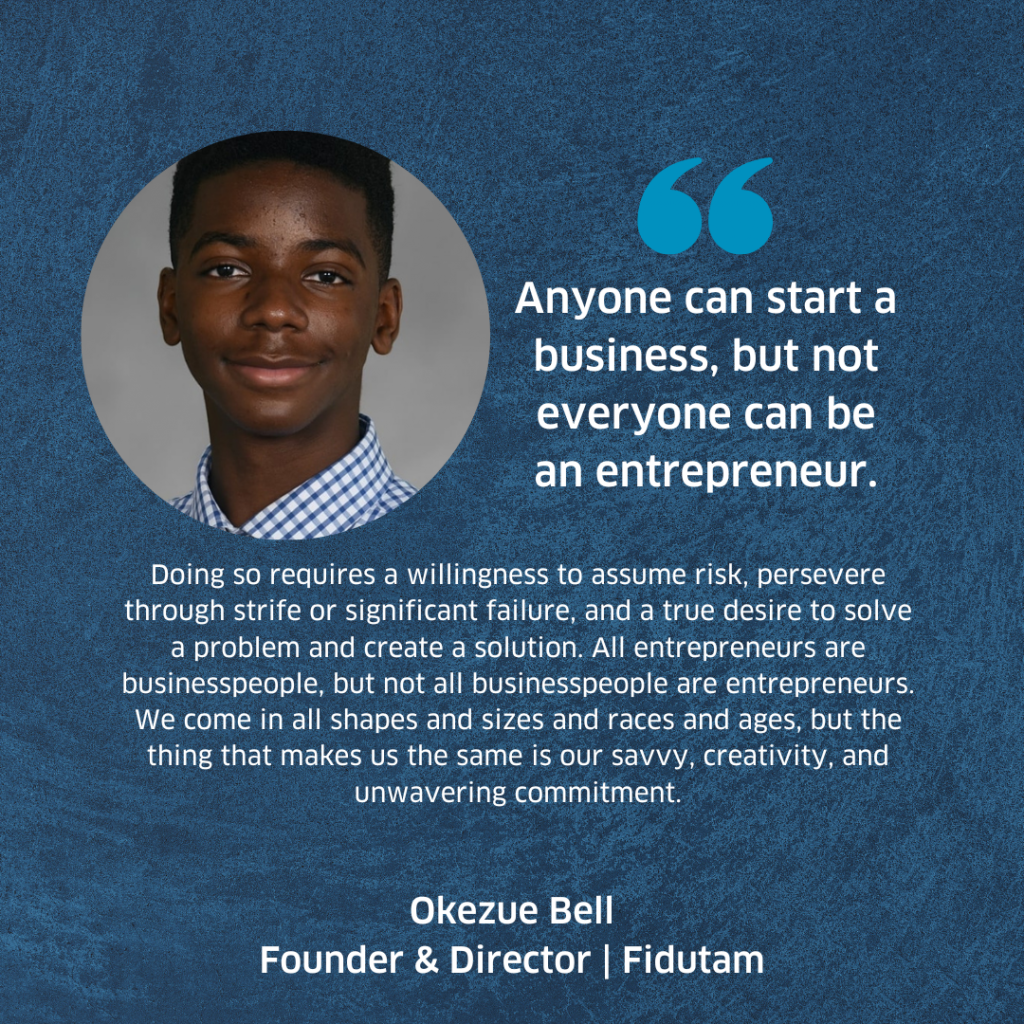 Okezue Bell: To me, entrepreneurship is the process of combining vision with execution in the context of a passion or product that one is dedicated to. Anyone can start a business, but not everyone can be an entrepreneur. Doing so requires a willingness to assume risk, persevere through strife or significant failure, and a true desire to solve a problem and create a solution. All entrepreneurs are businesspeople, but not all businesspeople are entrepreneurs. We come in all shapes and sizes and races and ages, but the thing that makes us the same is our savvy, creativity, and unwavering commitment. Therein lies the meaning of entrepreneurship.
Okezue Bell: To me, entrepreneurship is the process of combining vision with execution in the context of a passion or product that one is dedicated to. Anyone can start a business, but not everyone can be an entrepreneur. Doing so requires a willingness to assume risk, persevere through strife or significant failure, and a true desire to solve a problem and create a solution. All entrepreneurs are businesspeople, but not all businesspeople are entrepreneurs. We come in all shapes and sizes and races and ages, but the thing that makes us the same is our savvy, creativity, and unwavering commitment. Therein lies the meaning of entrepreneurship.
Tell us about your first experience with entrepreneurship.
OB: Unlike many entrepreneurs, I haven’t always had a business-oriented mind. I never wanted to raise money, start a lemonade stand, or find a way to bargain or save, but I was always committed to problem-solving, which I exemplified both in and out of the classroom, whether it was figuring out new methods to make sure my pencils didn’t break as often or finding ways to get more people to recycle. My first real exposure to entrepreneurship was in the 9th grade when I competed in DECA for the first time. My friend and I started a graphic design business that offered more inclusive and ethnic design elements at a lower cost. We got 6th at States and didn’t advance to internationals, but we started to understand the elements that underlie the fabric of entrepreneurship, later taking first at the international competition. Having to project our financials accurately across five years, validate our solution with experts, and conduct comparative analyses against existing solutions as a part of the exhilarating yet challenging DECA experience led up to our win last year at internationals and overall success with Fidutam.
What is your company’s origin story?
OB: One of my friends is an immigrant and many of mine are children of immigrants, respectively. We were initially developing virtual cards but pivoted when we — all relating to being first-generation immigrants — discussed the racial landscape of North America and Europe and how it affects Black and brown people. Then I learned about my friend’s experience immigrating from India and his family’s troubles setting up their economics (banking, finances, etc), and I realized that these things were a huge opportunity and a massive pain point that I was passionate about implementing. As a person of color, I have seen firsthand the negative effects that the racial hegemony that exists in banking and economics has on my and other communities.
Working on Fidutam was awesome. There was so much excitement, so many meetings, so many reach-outs. Even when things got boring, they were still exciting. That’s the powerful part of entrepreneurship. The early days let you experience the joys of pursuing something you are passionate about, and the less exciting days allow you to test that passion and push yourself, such that if/when you succeed, it’s that much more rewarding.
What do you wish you knew when you started? Is there anything you would do differently?
OB: wish I had known that it is OK to pivot. I didn’t realize that sometimes you need to make a complete 180 on your business mission, vision, or sometimes the project as a whole. Fidutam had to make a lot of pivots, but we made them late in the game, meaning we could’ve had even more progress than we do currently. This being said, I don’t really wish we did anything differently. The path we took has brought us to an exciting and unexpected destination! Perhaps we could have made better choices, raised more money, secured more advisors, scaled more. But with entrepreneurship, it’s better to just live in the present and trust in your decisions. Despite this being true, I’d like to acknowledge that I’m a 16-year-old with access to school, technology, and a great family, so I have leeway to make those more drastic decisions. So go with your gut, but make sure to weigh your choices against your circumstances (don’t take shortcuts or be rash, but also don’t be scared. Believe in what you are doing, and others will believe, too)!
What does “success” look like for you?
OB: To me, success is pursuing your passion wholeheartedly and with dedication, while also demonstrating actionable and significant progress as a result of the hard work. I want to impact 1 billion people, whether that be through Fidutam, my research, or other academic/social efforts. I am confident that my hard work, perseverance, and willingness to collaborate with and listen to others will get me there.
What is your superpower as an entrepreneur? What is your proudest and darkest moment so far? Share a key high and a key low from your journey if you can.
OB: My biggest strength as an entrepreneur is definitely my quick learning and communication skills. I personally don’t find it very difficult to talk on the fly, write on the fly, or learn new topics. Being involved in a variety of activities and being young probably helps that as well (yes, being young is a superpower that all youth should take advantage of!). To be honest, Fidutam is a relatively young project, so we haven’t had many drastic stories. I would say our pivot from financial cybersecurity tech to financial equity tech was both our proudest and darkest moment, because we pivoted to something that brought us to where we are today, but it was also one of the scariest decisions we’ve had to make.
What are your personal driving principles, and your top values?
OB: I believe firmly in integrity, results, and patience. These are the driving forces in all of my pursuits, whether academic, artistic, athletic, or entrepreneurial. I value communication, wit, and grit, because I think that these three characteristics are what define some of the most successful companies. I’m also a big believer in the idea of “work hard, play hard.” I believe that wins and progress should be celebrated, and followed up with more wins or progress.
How have your personal principles and values shaped your company’s values and principles?
I work with groups of motivated young people with similar values and principles as I, and it allows for us to progress smoothly on Fidutam and work together cohesively. We constantly share ideas without creating a toxic environment, and new thoughts are constantly bouncing off of us, mixing together, changing. Collaboration enables creation at Fidutam.
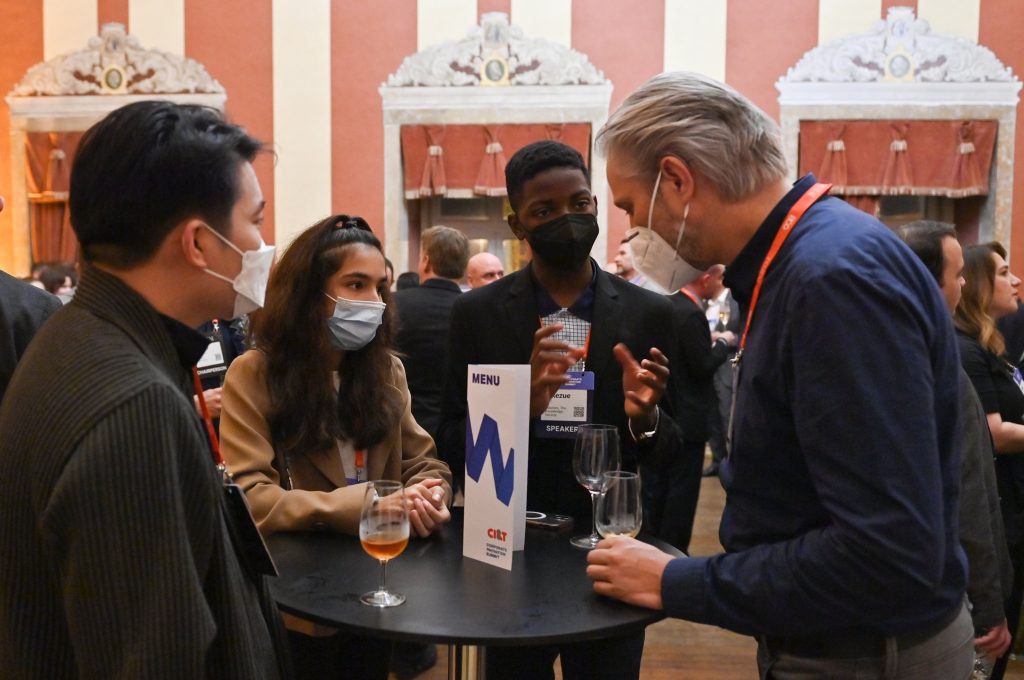
31 October 2021; CIS Dinner at Palacio de Xabregas prior to the start of Web Summit 2021 in Lisbon, Portugal. Photo by Harry Murphy/Web Summit via Sportsfile
What’s it like to work alone or with your partners?
OB: I’m not going to lie, I enjoy working alone. I find that there’s an exhilarating sense of joy when you can control the goings on of a project. You can enter a flow state, blow through work, seek validation of the ideas/progress, and make significant strides. However, sometimes that isn’t always the best option. What if your idea isn’t as good as you think, or you can’t think of or are missing a perspective or idea that is vital to your project? That’s where partners become integral. I think that both types of work are equally rewarding, though they provide different things to different people.
Do you have a mentor?
OB: Both myself and Fidutam have mentors/advisors that help validate our process and ensure we are on a good track. They often provide connections to important people in the space you are working in, or they can serve as a sort of calling card when reaching out, serving as a token of your and your company’s (Fidutam’s) validity.
Aside from the aforementioned, mentorship serves as a means by which I can stay focused. By having a mentor, I’m forced to constantly communicate my needs, progress, and understanding, which keeps me grounded, on top of my work, and aware. I am both a mentee and a mentor. I’m a mentee to my research advisors, teachers, parents, and Fidutam advisors, but a mentor to many young students and tutees. Given both of these perspectives, I am able to form new relationships and take advantage of both the rewarding opportunity to mentor others and the enlightening experience of being mentored.
Many entrepreneurs continue to perfect their daily routines to support their work and greater vision; would you mind sharing your morning routine or a regular ritual that grounds your work each day?
OB: Ah, this is something I still need to improve on! My mornings look different every day, aside from hygiene and prayer (I’m a Christian)…though I’ve made a habit of having a to-do list on Notion which keeps me organized and helps me ensure I get everything done on time. It has worked wonders this year, especially as everything has gone back in person!
What are you reading or have read?
OB: Wayetu Moore’s The Dragons, the Giant, the Women: A Memoir. I also really enjoyed Sapiens, I Killed Zoe Spanos, the Odyssey, and Their Eyes Were Watching God. I try to read as many black authors as possible and also enjoy a lot of poetry!
Where do you go for inspiration?
OB: Google or Google Scholar; sometimes Dribbble!
Do you have a favorite quote, mantra, or words of wisdom to get through the tough days?
OB: “Don’t count the days, make the days count.” – Muhammad Ali
What is a problem that keeps you up at night?
OB: The fact that people’s race and socioeconomic status informs whether or not they have the ability to upwards mobilize or even access the financial ecosystem! This is what Fidutam is trying to solve.
How do you think about helping others through your work?
OB: Since Fidutam’s work is predicated on the idea of supporting disenfranchised individuals and/or disadvantaged demographic groups, helping others through our work is a pretty straightforward process. For research, it’s making sure that my/our ideas get out of the lab and to those who need it most. It’s all about doing well while doing good.
What advice do you have for fellow (and aspiring) entrepreneurs building and leading teams?
OB: Take a chance, talk to people, be confident, and find something you’re passionate about, and the rest will fall into line.
What kind of an entrepreneur do you want to be known as – as in, what do you want your legacy to be?
OB: “The XX-year-old who has impacted 1-billion people” has a nice ring to it. In all seriousness, though, I want to be someone who was successful in leaving a positive mark on people’s lives, while also coming up with cool and new ideas. And of course, I want to be financially stable, and use my wealth to help build up others.
Have you raised outside capital so far?
OB: We have not raised capital, but are looking to get some preliminary investments. Instead of capital, we have pursued awards and grants. This means we can retain full ownership. Since we’re all students, we want to make sure we are in a position to commit to investments. We have received offers and met several investors, though.
We are planning on fundraising soon! We’ve set up a decentralized autonomous organization (DAO), in which people’s crypto-donations are used to fund Fidutam user accounts and our general operations.
Do you have someone you’d like to nominate to be profiled in our Faces of Entrepreneurship series? Please let us know by emailing media@thecenter.nasdaq.org or submit your nomination using this form.
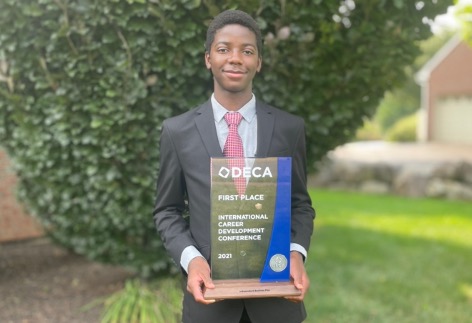

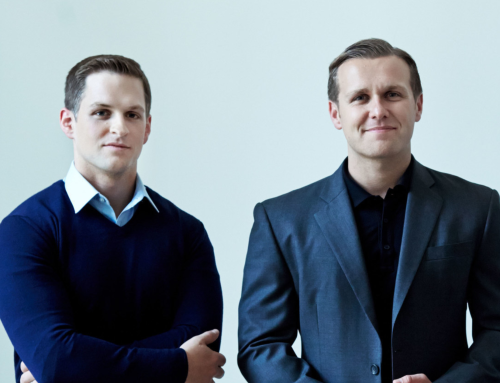
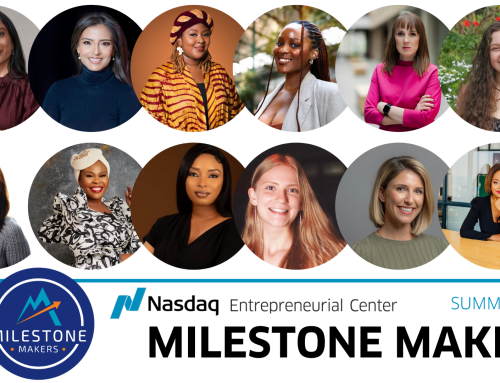
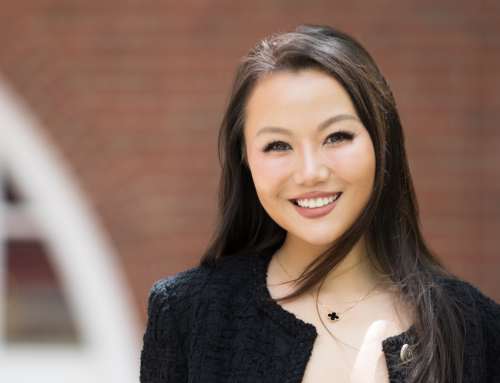
Invite a Friend
Close